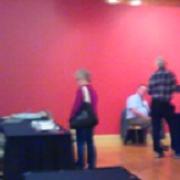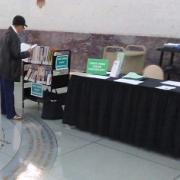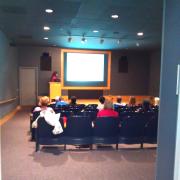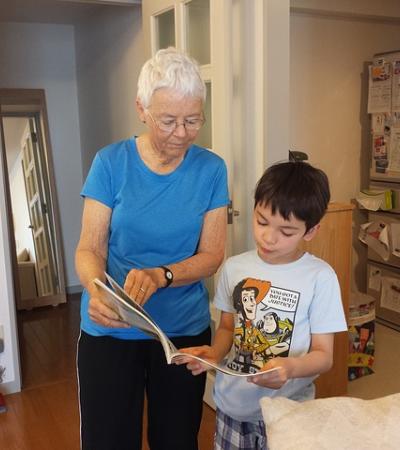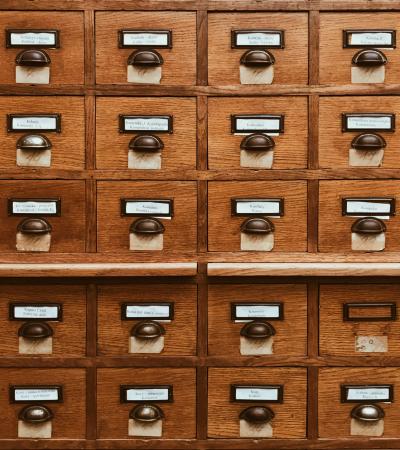Our library created a mini-genealogy conference called Family History Day. The event, which took place on a single Saturday in October, combined our genealogy classes from previous years with new activities. This format allowed us to concentrate our staffing needs into one day and three spaces, rather than spreading the need for staffing throughout the month.
We invited local genealogists to give lectures, participate in one-on-one sessions and give tours of the genealogical resources of our building. Local organizations, libraries and businesses were invited to take part in our expo area to connect with the community.
Advanced Planning
The idea for Family History Day was conceived in March 2016, which allowed for seven months of preparation. The planning was led by Kristen Edson, Anne Driver and Mary Decker, with the support of supervising librarian Lynn White. Our goal was to provide an immersive opportunity for adults interested in genealogy to learn about interesting topics, connect with experts and learn about new resources.
We started by securing space in the lower level of the Harold Washington Library Center, as space can be hard to come by with all the events that happen during a given day. Next, we targeted genealogists that would be available to give lectures, organizations to have in the expo, and volunteers to participate in our one-on-one consultations.
We met with our department of corporate and private events two weeks before the event to discuss room set-up and technology requirements.
Marketing
Our library's graphics and marketing department was crucial in making our promotional signs, fliers and programs for the day of. We posted descriptions to our online events calendar and in our email newsletter. The event was given a card on our website homepage and a special email blast was sent a week in advance. Our press release was picked up by a few neighborhood newspapers, such as Brighton Park Life. The event was also featured in Chicago on the Cheap. The marketing department also shared information via our Facebook and Twitter accounts.
All partners were given PDFs of the signs and fliers, as well as a link to the online event calendar, to share through their channels. We also submitted a copy of the print marketing materials to a local genealogy and family history interest group.
Budgeting
We had a budget of $600 to spend on lecturers. All other participants volunteered their time to promote their organizations. Volunteers and current library staff helped with our one-on-one consultations. We were able to provide all volunteers with small thank-you gifts of candy, water and reusable bags with our library branding.
Day-of-event Activity
We had six staff members manning the different areas of the program: a greeter, expo area, lecture room, floater and two greeters for the one-on-one consultations. A technician was also available to set up projectors for the lecturers and in the expo room.
Maintenance staff handled the set-up of tables and chairs the night before, and two staff members set up the other supplies starting at about 10 a.m. We gathered genealogy books to have available for check-out, information on our upcoming programs and specific genealogy resources. The schedule of events was:
- 11 a.m. - 12 p.m.: Genes for the Genealogist with Michelle Bray Wilson. Attendees learned how DNA can be used for genealogical research.
- 12:15 - 1:15 p.m.: Your House Has A History with Grace Dumelle. Dumelle showed how to use online and in-person avenues to learn about Chicago homes.
- 1:45 - 2:45 p.m.: Wonderful Websites: Real Records Online with Debra Mieszala. This event reviewed websites that contain original genealogical records.
- 3 - 4 p.m.: Introduction to ChicagoAncestors.org with Becky Lowery. Guests were introduced to ChicagoAncestors, a website that provides information on Chicago neighborhoods, churches, buildings and events.
- 12:30 & 2:30 p.m.: Tour the Chicago Public Library's Genealogical Resources with Craig Pfannkuche. Pfannkuche discussed the importance of the material for doing family research in Chicago.
- 11:30 a.m. - 3:30 p.m.: Ask a Genealogist. Short one-on-one consultations were available for those who wanted to speak to a professional genealogist or a librarian.
- 11:30 a.m. - 3:30 p.m.: Genealogy & Family History Expo. Representatives from The Newberry Library, National Archives, Story Corps and Photo Grafix helped answer questions to attendees.
Program Execution
With so many different events and spaces, attendance was hard to document. There were roughly 150 participants spread across our eight programs that day. The lectures had an average attendance of 18 people, and we conducted 20 one-on-one consultations.
It was especially difficult to calculate attendance for the expo area, as it was a passive area that participants could wander through. Staff conducted a short survey at the end of the day and documented many positive experiences.
Our short five-question survey revealed that a large majority of attendees found the day useful and want to see the program repeated next year. Because of our surveys, next year we plan to have a longer break between lectures, allowing attendees to visit other areas in between sessions. We also received some feedback that illustrated that we are still struggling to market our programs.
As the day was going on, staff took notes on logistical matters that arose to help with next year.
One thing we did not account for was Open House Chicago, an annual architectural event in Chicago that was held on the same day. Several participants mentioned walking through our building, finding out about Family History Day and being unable to stay as they were in town for Open House Chicago.
Advice
First off, we will not be holding the event next year on the same day as Open House Chicago. We will also start our planning even earlier to try and get more coverage for the event.
Having staff that has worked a large event in the actual space before is a great asset to have. Keep in mind the strengths of your staff when assigning tasks or stations for the day. Having more staff is always better. For instance, I wish we would have had one more person so I could be available to speak with our participating organizations.
Gather as much information as possible on the topics your community is interested in to target lecturers for them.
Supporting Materials
- Feedback (Coming Soon!)
- Programming Librarian Facebook Group

